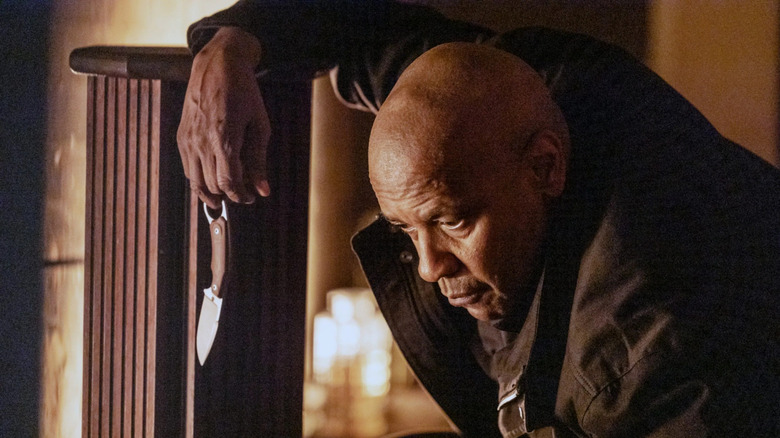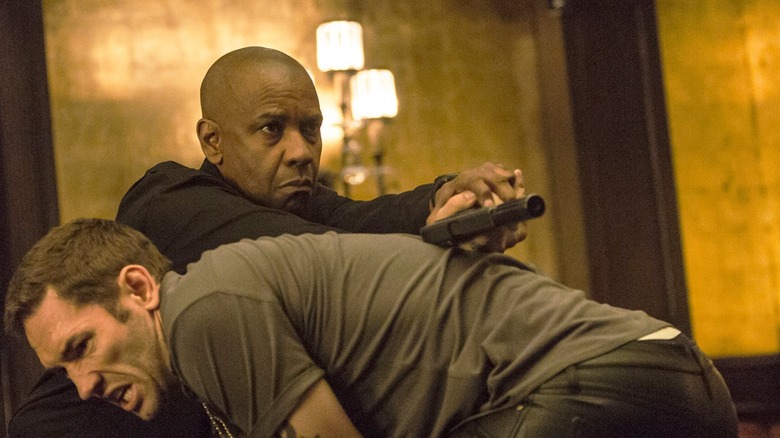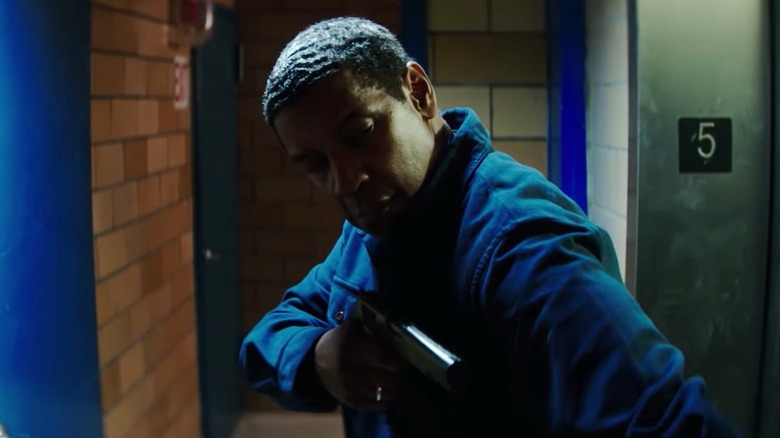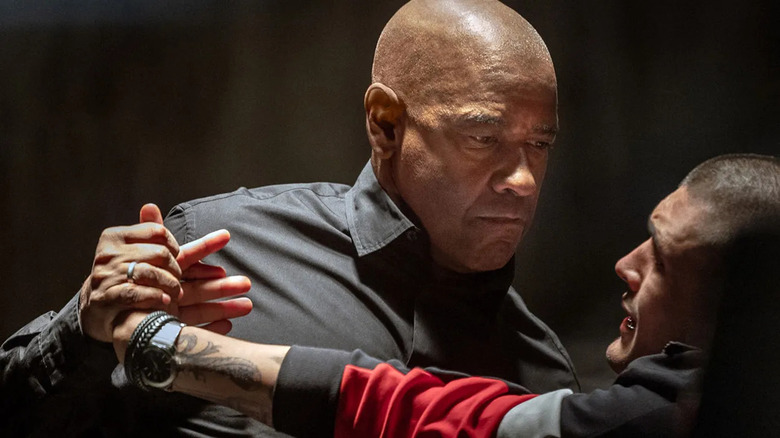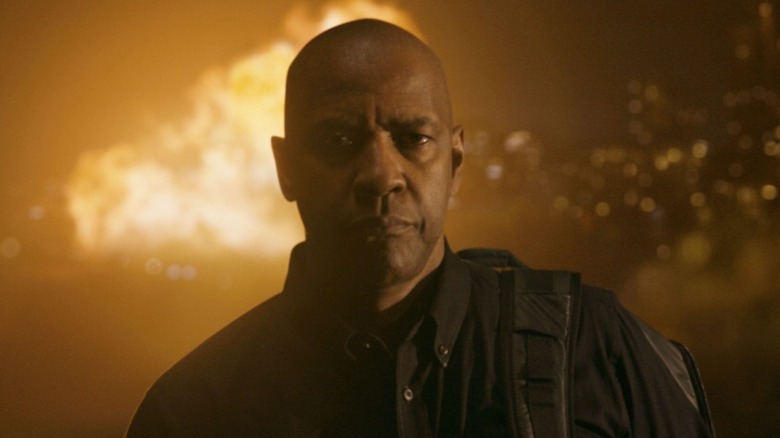The Equalizer Series Is Secretly Denzel Washington's Slasher Horror Series
On paper, the action and horror genres seem like they'd be strange bedfellows. After all, the general aim of action films is to provide adrenaline-fueled thrills, while horror movies are (again, in general) intended to disturb, scare, and unnerve.
Yet in practice, the genres blend far better and far more often than may be expected. I can still remember schoolyard chums excitedly recounting the ways in which Bruce Willis' John McClane dispatched terrorists in "Die Hard 2" (such as when he shoves an icicle into a baddie's eye), kills that would be wholly appropriate in a "Friday the 13th" or "A Nightmare on Elm Street" film. Hollywood producers certainly saw the connections; Renny Harlin, who directed "Die Hard 2," won the gig after making horror films like "Prison" and "A Nightmare on Elm Street 4: The Dream Master."
In 2023, the action and horror genres have long been considered an excellent peanut-butter-and-chocolate combo, with much cross-pollination happening within them. Yet some films and franchises can still blend the genres together in ways that blur the lines between the two. The best example of that is "The Equalizer" trilogy, which is currently wrapping up in theaters everywhere with "The Equalizer 3." The films not only have a remarkable consistency behind the scenes (they're all directed by Antoine Fuqua, written by Richard Wenk, and star Denzel Washington), they also consistently push the action genre further into a horror space, making the "Equalizer" trilogy a secret slasher horror series.
The vigilante as executioner
It's possible that fans of the Fuqua/Washington "Equalizer" films may not realize that the movies are based on a TV series of the same name, which aired on CBS from 1985 to 1989. The show starred Edward Woodward (himself a veteran of one of the most influential folk horror films ever made, "The Wicker Man") as ex-covert ops officer Robert McCall, a man looking to absolve the sins of his past by helping strangers in need any way he can. As the series' moody intro sequence demonstrates, the tone of the show sought to exploit the urban panic of the '70s and '80s.
That panic was featured within both horror films ("The Last House on the Left," "The Driller Killer") and a run of vigilante action films of the same period, movies like "Death Wish," "Fighting Back," and the aptly-named "Vigilante." In these films, the crimes and violence perpetrated by the baddies were often random acts, the victims were often total innocents, and the villains were often depicted as inhuman as possible, essentially making them into unequivocal monsters. This meant that the violence given back to them by the vigilante heroes (or anti-heroes) felt entirely justified, even and especially if that violence would be seen as abhorrent in any other context.
In essence, the difference between the vigilante hero and the slasher movie killer lies less in their actions and more in their choice of victims: typically, the baddies in an action movie deserve their fates, and the victims in a slasher movie don't. However, there exists a good deal of ambiguity in slasher films with regard to characters who cross some moral line, big or small, and thus "deserve" what comes their way.
The power of transgression
One of the most powerful tropes in an action film is when some bad dudes mess with the wrong bad dude. 2014's "The Equalizer" does this trope wonderfully, as the seemingly mild-mannered Robert McCall (Washington) is crossed by a variety of people in need of some punishment, such as a gunman looking to rob the hardware store he works at. In the course of the film, McCall befriends a teenage prostitute, Alina (Chloë Grace Moretz), and thanks to her pimp beating her in Robert's presence, McCall ends up taking on the entire Russian mafia. The bodies pile up so much that it leads McCall's old colleagues at the Defense Intelligence Agency to realize that McCall didn't, in fact, die in a bombing years before as rumored.
That last point demonstrates how McCall's story is structured much like the average slasher villain, with his supposed bombing death acting as the "prior evil" (as "Friday the 13th" screenwriter Victor Miller likes to call it) in the past that doubles as foreshadowing of the character's eventual return. More than that is the fact that McCall isn't "activated" until he discovers behavior that requires justice to be doled out by him alone. This is akin to the core horror trope of transgression, wherein a character or characters cause a chain reaction of events by doing something they're not supposed to do — going into an old dark house, reading an occult book, etc.
Once "activated," McCall cannot be stopped until he punishes all involved with the transgression. As with Pinhead in "Hellraiser," people "open the box," and he comes. As with the title character of "Pumpkinhead," McCall gives no quarter or mercy to those he's been set upon. As with Jigsaw in "Saw," McCall considers his punishments to be wholly fair, even if the potential consequences of his actions take a heavy emotional toll on him.
The thrill of the kill
Of course, the aspect the "Equalizer" films have most in common with slasher films is their kills. Oh, those glorious kills! While the films that ushered in the slasher craze — such as 1973's "Black Christmas" and 1974's "The Texas Chain Saw Massacre — are relatively light on blood and gore, that all changed once "Friday the 13th" hit screens in 1980.
Sure, gore on screen was nothing really new by then — a bevy of Italian horror films and giallos had gotten very creative with their kills during the '70s, for example, and let's not forget the contributions of Pennsylvania's own Herschell Gordon Lewis. The sea change "Friday the 13th" represented was less to do with the film's actual content, and more to do with its marketing. Its original trailer promised that audiences would see a body count of at least 13 people in the movie, and as such the marketing for other slasher films that immediately followed capitalized on the spectacle of the kill scenes rather than any actual story elements. Thus, slashers became synonymous with creative kills, for better or worse.
The action genre has a similar history with the dispatching of enemies, especially as the targets became less human and more mere (literal and figurative) cannon fodder. Who can forget Arnold Schwarzenegger brandishing a rocket launcher in "Commando?" It's a moment that leads all the way to Dwayne Johnson lugging around a helicopter's minigun in "Furious 7" (a movie directed by the filmmaker behind new horror classics "Insidious" and "The Conjuring," James Wan).
The "Equalizer" films aren't going for mere excess; they're combining the "oh wow, did you see that?" creativity seen in '80s action films with the intimate horror of a Jason Voorhees or Michael Myers. In the "Equalizer" series, McCall uses everything from hands, guns, and knives to cars, microwaves, other bodies, and a hurricane (one could argue in a metaphorical sense, anyway) to take out his opponents. Fuqua shoots these moments with visual aplomb, too, making them not just incidents but showpieces akin to the slasher tradition.
He's only slightly mad
In slasher films, the killers cannot stop doing what they do best — they're addicted to killing, and they're also, at minimum, insane. Even in slasher franchises where the killer is someone different every time, as with the "Scream" films, there's a sense of competition with the past. That idea is also latent within the action movie, as both genres have embraced the "body count" statistic — witness this hilarious moment from "Hot Shots! Part Deux" as proof. The "Equalizer" movies are no different, with the sheer number of the bodies McCall leaves behind being almost as impressive as the ways in which he takes them out.
Robert McCall is the hero of the movies, as he's not only always doing the right thing for the innocent people who cross his path but going above and beyond for them. Yet Fuqua, Wenk, and especially Washington don't let Robert off that easy, as he's always at least a little emotionally conflicted about the violence he doles out on a regular basis. Perhaps in reaction to this, Washington leans into McCall's personality tics: the man is neurotic, incredibly particular in his tastes and routines. He's so thorough that he often times himself on his digital watch when he goes to work, clearing a room full of baddies in mere seconds. In addition, he's also worryingly unpredictable when he's in killer mode — at a key moment in "Equalizer 3," McCall starts singing a spiritual hymnal while watching his nemesis die. Then, of course, there's the fact that McCall is seemingly unkillable — sure, the third movie is purported to be the last, but that may not actually be the case, as us slasher fans know that "The Final Chapter" (which "Equalizer 3" is being advertised as) is usually anything but.
All of this makes McCall into a mythic, larger-than-life figure in much the same way the slasher characters are. Whether it's Ghostface, Freddy Krueger, or Robert McCall, these are people you don't want to see coming toward you in a dark alley. What makes McCall and others like him in the action genre so compelling is the idea that the innocent can see justice be served in a manner as ferocious and thorough as misfortune. In other words, thank God he's on our side.
"The Equalizer 3" is currently in theaters.
